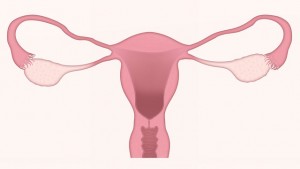Menstrual Cramps or Endometriosis?
I’ve long lost count of the number of times I have heard patients, friends, family members, even perfect strangers complain about that “dreaded time of month”. Popping pain killers every few hours, staying home from work or school, and sometimes even not being able to get out of bed due to such extreme pain has somehow become acceptable and just something we have to put up with as women. THIS. IS. NOT. OK.
One of the first things I do in a new patient visit is talk about the difference between normal and common when it comes to period symptoms (and any other symptoms for that matter!). We often think that it is normal to suffer through debilitating cramps, heavy bleeding and PMS symptoms that interfere with our day to day lives. This is not the case and these are NOT normal symptoms that we should be expected to just “live with”, yet it is a very common experience for so many women.
More often than not, when women see their doctor for these types of symptoms, they are either prescribed birth control, an anti-depressant, or told to take ibuprofen and that their experience is “normal”. If they are lucky, their physician might order some blood work, imaging, or refer them to a gynaecologist.
I strongly believe we need to do better, and to do better, we first need to know better. So if you’re reading this and you struggle with significant period pain, now you know – it is not normal. Ask your doctor for appropriate assessment or referral, ask questions about your symptoms, take an active role in your health care because if you aren’t standing up for yourself and telling your doctor about your symptoms, they likely aren’t going to ask.
When a patient comes to my office with severe menstrual pain, one of the conditions I assess for is endometriosis. It is slowly starting to gain more awareness and media attention with celebrities speaking up about living with the condition, but we still have a long way to go. Endometriosis is still largely under-diagnosed, and for the women who do continue to speak up about their pain, it takes an average of 7 years to be diagnosed.
Now that we’ve covered some of the common struggles and roadblocks women face when it comes to period pain, let’s take a look at endometriosis itself – what it is, the signs and symptoms, how its diagnosed, and of course some treatment options.
ENDOMETRIOSIS
Endometriosis is the presence of endometrial cells or tissue outside of the uterus, most commonly on other organs in the pelvic cavity including the ovaries and fallopian tubes, bladder and colon.
Throughout the menstrual cycle, the same hormones that promote thickening of the endometrial lining in the uterus and then lead to a period bleed have the same effect on endometrial tissue outside of the uterus, leading to bleeding in the pelvic cavity. This leads to inflammation, scar tissue formation, adhesions, and of course PAIN.
The most common signs and symptoms of endometriosis can include severe period pain, pelvic pain throughout the month, pain with sexual intercourse, pain with urination or bowel movements, low back pain, heavy periods, and infertility.
Approximately 1 in 10 women live with endometriosis, maybe even more considering the barriers to proper assessment and diagnosis. The gold standard for diagnosing endometriosis is invasive laproscopic surgery, however your doctor can also diagnose you based on your symptoms, history, pelvic exam and ultrasound or other imaging.
The root cause of endometriosis is still debated, but likely includes and is influenced by multiple factors such as genetics, environmental exposure to toxins and hormone disrupting chemicals, immune system/autoimmunity, inflammation, and bacterial involvement.
CONVENTIONAL TREATMENT
First line treatment for women seeking treatment for menstrual pain is typically NSAID drugs such as Advil or Motrin. Unfortunately for women with endometriosis, these aren’t always successful at reducing pain.
Hormonal birth control (including pills, patches, injections and IUDs) are also often given to manage pain symptoms. These can be helpful for some women to control pain, however they do not treat the root cause of the issue. This means that when treatment is discontinued, symptoms are likely to return, often worse than before.
Surgery is another common treatment option for some women who continue to experience significant pain and/or bleeding after trying other treatment options such as the ones previously mentioned. Laproscopic surgery to remove endometriosis can be helpful for reducing pain and improving fertility. If children are not desired, or pain is unable to be controlled, some women will undergo a hysterectomy as a last resort.
NATUROPATHIC TREATMENT
There are MANY treatment options that your Naturopathic Doctor might recommend based on YOUR individual situation. Here are a few of the most common:
Dietary – Reducing intake of animal fat (eliminate dairy, choose organic lean meats), increase fibre intake, increase vegetable intake (especially cruciferous vegetables like broccoli, cauliflower, brussels sprouts and broccoli sprouts)
Lifestyle – Optimize sleep, stress management (gentle exercise, mindfulness/meditation, etc)
Environmental – Use natural cleaning, health and beauty products to reduce exposure to hormone disrupting chemicals. The Environmental Working Group is a great resource for finding safe and effective alternatives to your current products!
Supplements – Anti-inflammatory supplements including omega 3 and curcumin are often recommended. Supplements to reduce excess estrogen including DIM, I3C and period are also recommended for some patients. *supplements should not be taken without recommendation from a qualified health care professional*
Acupuncture – Can help manage pelvic pain and other symptoms in women with endometriosis.
________
If you struggle with severe period pain, or if you’ve been diagnosed with endometriosis, feel free to share your experience and if you’ve been able to find a treatment plan that works for you!
Now practicing at the Living Science Wellness Centre contact us to book an appointment 613-836-7901, or email: info@livingscience.ca.
This article is shared with permission from Dr. Melanie Craig ND.




 ~
~